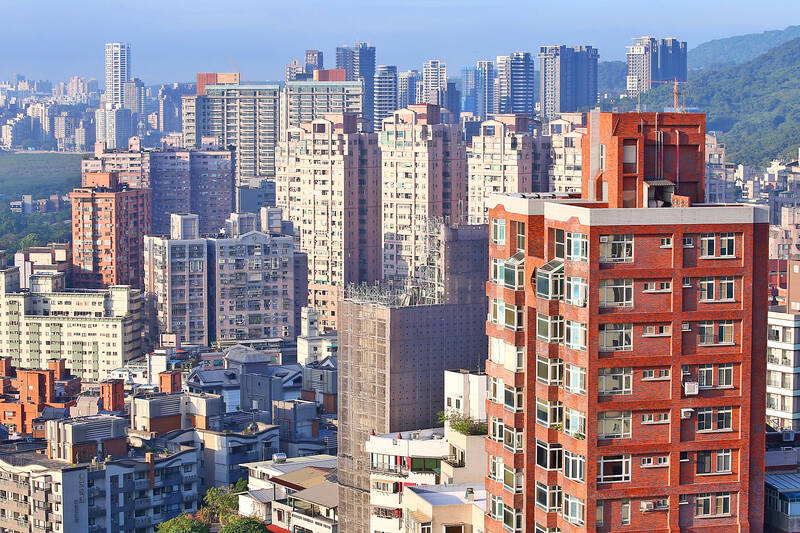Presale projects and new houses last year totaled NT$1.1 trillion (US$34.84 billion) in northern Taiwan, suggesting a 12.1 percent fall to a four-year low, as unfavorable policy measures and economic uncertainty prompted developers to stay conservative, Chinese-language My Housing Monthly (住展雜誌) said yesterday.
Taipei and Yilan County bucked the trend with annual increases of 8.7 percent and 36 percent to NT$290.18 billion and NT$27.97 billion respectively, while Keelung posted the steepest decline of 52.9 percent, the magazine said.
Presale projects and new houses slumped 27.2 percent to NT$244.67 billion in Taoyuan, dropped 15.3 percent to NT$372.77 billion in New Taipei City and decreased 8.4 percent to NT$157.26 billion in Hsinchu city and county, it said.

Photo: CNA
Developers adopted a conservative business approach last year to cope with unfavorable policy measures including interest rate hikes, a ban on transfers of presale project purchase contracts, credit controls and other restrictive terms, My Housing Monthly spokesman Chen Ping-chen (陳炳辰) said.
Other negative factors also included a global economic slowdown that weighed on Taiwan’s exports and political uncertainty linked to the recently concluded presidential election, Chen said.
Taipei managed a modest growth despite rising house prices caused by high-profile projects in Daan (大安), Songshan (松山) and Zhongshan (中山) districts, Chen said.
House prices in the capital have proved resilient in bad times, giving companies the confidence to go ahead with product launches, he said, adding that the pace of correction is limited in New Taipei City, as people grow increasingly interested in living in New Taipei City and Taipei.
Taoyuan fared badly as developers focused their attention on New Taipei City and Taipei, Chen said.
Yilan reported a fast advance due to the introduction of major apartment complexes in Suao (蘇澳) and Wujie (五結) townships, while a high comparison base in 2022 contributed to Keelung’s poor showing last year, he said.
The market might sail smoothly this year, as the presidential election is over and the incoming administration would be business-friendly, Chen said.
The central bank has since June last year held interest rates unchanged and is unlikely to turn hawkish moving forward, he said.
Developers who previously stayed on the sidelines might be more active this year, encouraged by continued interest subsidies for first-home purchases, Chen said.

Taiwan Semiconductor Manufacturing Co (TSMC, 台積電) last week recorded an increase in the number of shareholders to the highest in almost eight months, despite its share price falling 3.38 percent from the previous week, Taiwan Stock Exchange data released on Saturday showed. As of Friday, TSMC had 1.88 million shareholders, the most since the week of April 25 and an increase of 31,870 from the previous week, the data showed. The number of shareholders jumped despite a drop of NT$50 (US$1.59), or 3.38 percent, in TSMC’s share price from a week earlier to NT$1,430, as investors took profits from their earlier gains

In a high-security Shenzhen laboratory, Chinese scientists have built what Washington has spent years trying to prevent: a prototype of a machine capable of producing the cutting-edge semiconductor chips that power artificial intelligence (AI), smartphones and weapons central to Western military dominance, Reuters has learned. Completed early this year and undergoing testing, the prototype fills nearly an entire factory floor. It was built by a team of former engineers from Dutch semiconductor giant ASML who reverse-engineered the company’s extreme ultraviolet lithography (EUV) machines, according to two people with knowledge of the project. EUV machines sit at the heart of a technological Cold

Taiwan’s long-term economic competitiveness will hinge not only on national champions like Taiwan Semiconductor Manufacturing Co. (TSMC, 台積電) but also on the widespread adoption of artificial intelligence (AI) and other emerging technologies, a US-based scholar has said. At a lecture in Taipei on Tuesday, Jeffrey Ding, assistant professor of political science at the George Washington University and author of "Technology and the Rise of Great Powers," argued that historical experience shows that general-purpose technologies (GPTs) — such as electricity, computers and now AI — shape long-term economic advantages through their diffusion across the broader economy. "What really matters is not who pioneers

TAIWAN VALUE CHAIN: Foxtron is to fully own Luxgen following the transaction and it plans to launch a new electric model, the Foxtron Bria, in Taiwan next year Yulon Motor Co (裕隆汽車) yesterday said that its board of directors approved the disposal of its electric vehicle (EV) unit, Luxgen Motor Co (納智捷汽車), to Foxtron Vehicle Technologies Co (鴻華先進) for NT$787.6 million (US$24.98 million). Foxtron, a half-half joint venture between Yulon affiliate Hua-Chuang Automobile Information Technical Center Co (華創車電) and Hon Hai Precision Industry Co (鴻海精密), expects to wrap up the deal in the first quarter of next year. Foxtron would fully own Luxgen following the transaction, including five car distributing companies, outlets and all employees. The deal is subject to the approval of the Fair Trade Commission, Foxtron said. “Foxtron will be